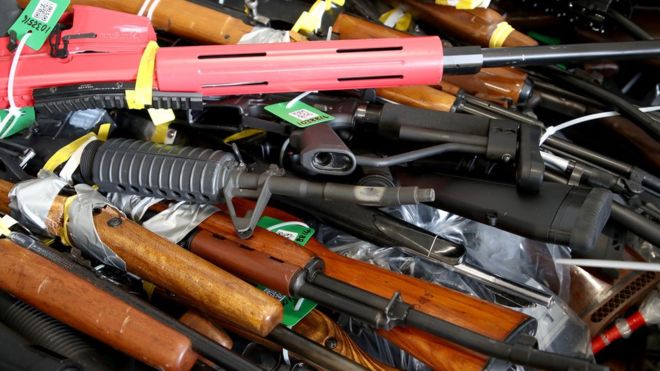More than 56,000 weapons have been handed to authorities in New Zealand during a six-month amnesty, police say.
The buy-back scheme was launched when authorities banned semi-automatic weapon in response to the killing of 51 people at two mosques in Christchurch.
The ban was agreed by parliament weeks after the 15 March shootings – the worst in modern times in New Zealand.
Australian Brenton Tarrant, a self-proclaimed white supremacist, has been charged and faces trial next year.
Was the programme a success?
The scheme was launched in April.
In return for handing in the firearms, owners were compensated up to 95% of the original price of the weapons.
The programme ended on 20 December with police hailing the amnesty as a success.
“We have taken well over 50,000 of these guns out of our community. That’s got to be a good thing,” said Police Minister Stuart Nash.
However, the amnesty has faced some criticism from some groups including the Council of Licensed Firearms Owners.
The group’s spokeswoman Nicole McKee told the New Zealand Herald that she believed there were 170,000 prohibited guns in the country.
Speaking about gun owners, she said: “Some of them are going to hide their firearms, some of them are protecting history and some of them – a good portion of them – don’t know what’s going on.”
In 2016, New Zealand Police estimated that there were 1.2 million legal firearms owned by civilians – which equates to around one for every four people.
What happened in Christchurch?
On 15 March, Brenton Tarrant attacked the Al Noor mosque and Linwood Islamic Centre in Christchurch.
He is charged with the murder of 51 people, 40 counts of attempted murder and one terrorism charge.
The gunman was armed with semi-automatic rifles, and is believed to have modified his weapons with high-capacity magazines so they could hold more bullets.
He pleaded not guilty to all charges and is expected to face trial next year.

BBC

Putting a spotlight on business, inventions, leadership, influencers, women, technology, and lifestyle. We inspire, educate, celebrate success and reward resilience.















